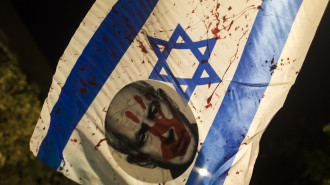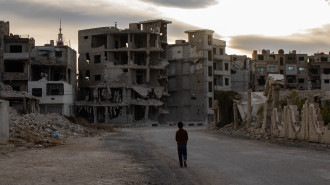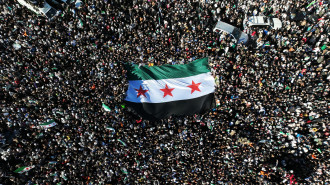Breadcrumb
Syria Weekly: Cooking gas and corruption might save Idlib from a regime assault
Armoured columns were rushed towards the regime frontlines near Syria's Idlib this week, igniting fears that a new military offensive is planned for the opposition stronghold, home to around three million civilians.
Lines of tanks and armoured vehicles have been a relatively common sight in Hama since an all-out assault on the Idlib province was called off last year, after a zero hour deal was agreed between Russia and Turkey.
Although the buffer zone that was established should have helped de-escalate tensions between the regime and rebels, there have been almost daily exchanges of fire between the two sides.
Air raids
This week saw a marked uptick in shelling and bombing of the Idlib province, which resulted in the destruction of at least three medical facilities by airstrikes, which was condemned by the United Nations [UN] and the US.
"All three incidents further limit civilians' access to basic healthcare in northwest Syria," the UN said. Although no actors were named, Russia is thought to be behind the attacks.
The US on Tuesday condemned both Russia and the hardline rebel group Hayat Tahrir al-Sham [HTS] – which has dominated Idlib since its offensive in January – for the latest surge in violence.
"The [US] is alarmed by the escalation of violence in Idlib and northern Hama. Ongoing Russian and regime airstrikes, along with attacks by [HTS] and other groups connected to al-Qaeda in Syria, continue to destabilise the region, exacerbate the dire humanitarian situation, and cause dozens of civilian deaths and injuries – many of them children," the State Department said in a statement.
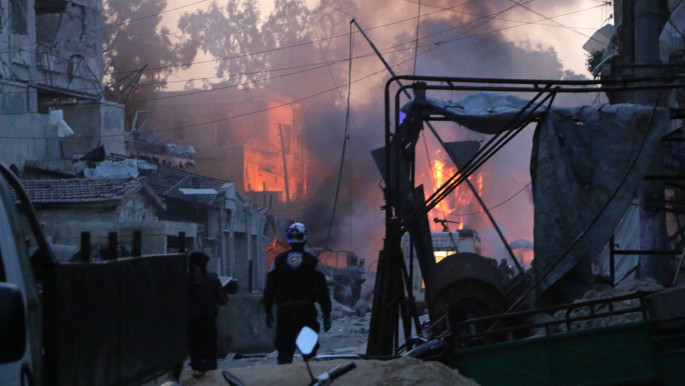 |
| Idlib has been pounded by airstrikes again [Getty] |
HTS argued that rocketfire and commando raids by its fighters are largely in response to the much more intense violence experienced by civilians in rebel-held Idlib in recent weeks.
In March, Russia and the regime launched thousands of strikes on Idlib's de-escalation zone, killing at least 135 civilians and forcing tens of thousands of residents to flee their homes – many have been displaced multiple times throughout the war.
Although violence had somewhat scaled down, Airwars has noted a significant increase in attacks on Idlib in recent days. Although most strikes appear to be on areas close to the frontlines between the regime and rebels, civilians have undoubtedly suffered the most.
"After months of relative quiet, Airwars is extremely concerned by the significant jump in reported Russian civilian harm events in Syria in recent days," Chris Woods, director of Airwars told The New Arab.
"Hundreds of thousands of civilians in Idlib and Hama have nowhere to run – and the risk of major casualties remains severe should these governorates again turn into battlegrounds."
 |
Hundreds of thousands of civilians in Idlib and Hama have nowhere to run – and the risk of major casualties remains severe should these governorates again turn into battlegrounds |  |
Humanitarian crisis
There have been concerns about the humanitarian situation in Idlib since HTS took over the province in January, with subsequent aid cuts taking their toll.
Last week, rebels launched a number of drones and rockets on neighbouring Latakia province, with the intended aim of dropping bombs on Russia's Hmeimim airbase, sparking anger in Moscow.
Haid Haid, a research fellow at the International Centre for the Study of Radicalisation at King's College London, believes that recent calls for joint patrols by Turkey's President Recep Tayyip Erdogan and Russia's Vladimir Putin – during a recent meeting in the Kazakh capital, Astana – means that a full-scale offensive on Idlib is unlikely, although more limited military action cannot be ruled out.
"I don't believe there will be an imminent attack on Idlib, as has previously been indicated, due to the earlier statements from Erdogan and Putin at Astana. The leaders of armed groups I have spoken to also don't expect an attack soon," he told The New Arab.
Haid believes there are a number of likely factors for the recent surge in violence and deployment of more regime forces to Hama. One motive for Russia is to hit back at rebels who launched the drones on Latakia – likely from Jisr al-Shighour in northwestern Idlib.
With the security of Hmeimim a primary concern for Moscow, Russia is said to be working with Turkey to increase its presence in the buffer zone and push rebel fighters further away from the frontlines.
"There is talk of joint patrols in the buffer zone between Russia and Turkey, and for this to happen there needs to be more forces to secure the area," the researcher added. The recent reinforcements sent to Hama could be intended to boost security in the Idlib buffer zone if needed.
"They will need backup in case they need to launch a last-minute offensive to protect the [Turkish and Russian] troops in the zone."
The fact that rebel groups, including Jaish al-Ezzeh, have said they will treat Russian troops in the area as an occupying force gives credence to these fears.
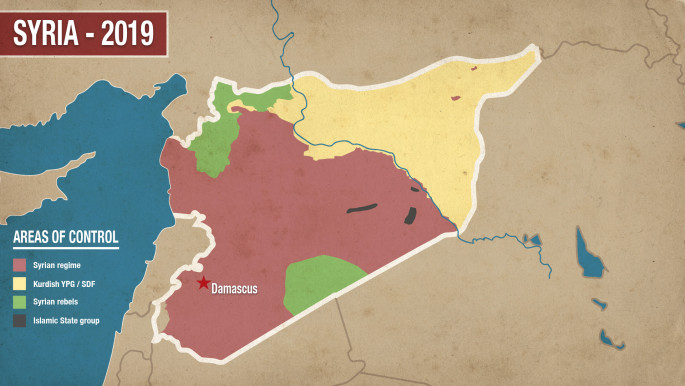 |
|
Smuggling
Russian troops are already present on the Idlib frontlines, officially as observers, but the prominence of the Moscow-linked Fifth Corps among the reinforcements highlights a powerplay in northern Hama between the regime's two principle international backers.
"There is an internal struggle for influence between Russia and Iran in Syria. Sending more reinforcements linked to Moscow increases Russia's dominance in northern Hama and pushes Iran further away," he added.
Meanwhile, Syria's severe oil shortages – which have led to miles-long queues at petrol stations – could be used by the regime to distract public attention away from dire economic conditions in Syria and towards the war effort.
"Even without a large-scale offensive, the reinforcements will remind people that the country is in a state of war, which could help distract attention," he said.
 |
Even without a large-scale offensive, the reinforcements will remind people that the country is in a state of war, which could help distract attention |  |
Despite this, the regime is still hostage to a situation where powerful figures in Syria's military have become key players in blackmarket trade, which could limit Damascus' appetite for large-scale intervention in Idlib.
"Not cutting the smuggling routes from greater Idlib to regime areas could also be a secondary reason for [Damascus] not carrying out an offensive now," said Haid.
He said that domestic crossings close to the frontlines have been used to smuggle petrol and cooking gas into regime-controlled territories, where there has been a shortage of basic goods.
"[The smuggling] is helping provide much-needed goods to local communities," Haid added.
"On top of that most of those smuggling routes are benefiting regime's officials and profiteers, who will likely try to postpone any attack that might harm that source of income."
Divisions in the regime between competing military commanders and the rivalry between Russia and Iran might stave off large-scale military action on Idlib for now.
With little sign of a political breakthrough between the two sides, civilians in Idlib will continue to fall victim to the daily cycle of shelling in a continued battle that neither side can yet win.
Syria Weekly is a new, regular feature from The New Arab. To get Syria Weekly in your inbox each week, sign up here
Paul McLoughlin is a news editor at The New Arab.
Follow him on Twitter: @PaullMcLoughlin






![Anthony Blinken speech [Getty] Anthony Blinken speech [Getty]](/sites/default/files/styles/image_684x385/public/media/images/6263436E-8ACD-4D3C-9055-25A7BE79DD5A.jpg?h=d1cb525d&itok=fLHmHCRG)
 Follow the Middle East's top stories in English at The New Arab on Google News
Follow the Middle East's top stories in English at The New Arab on Google News
